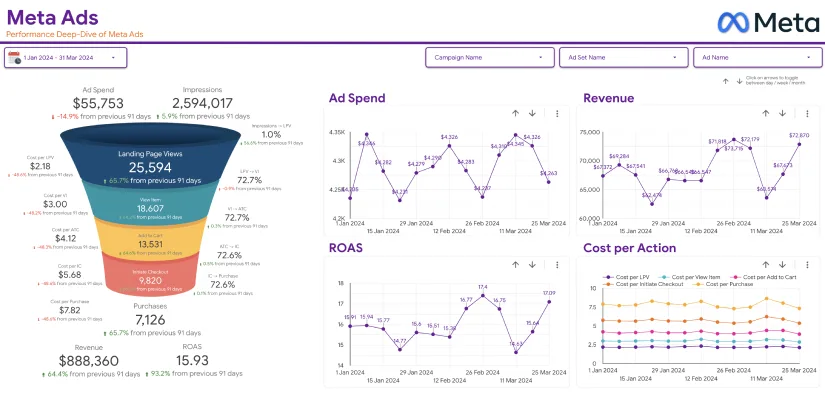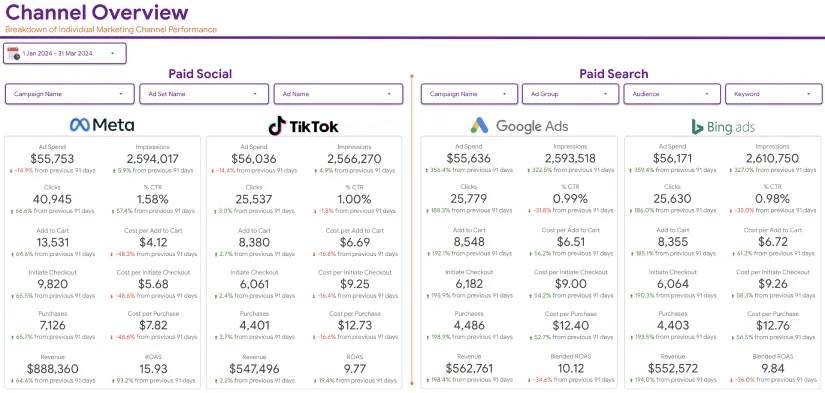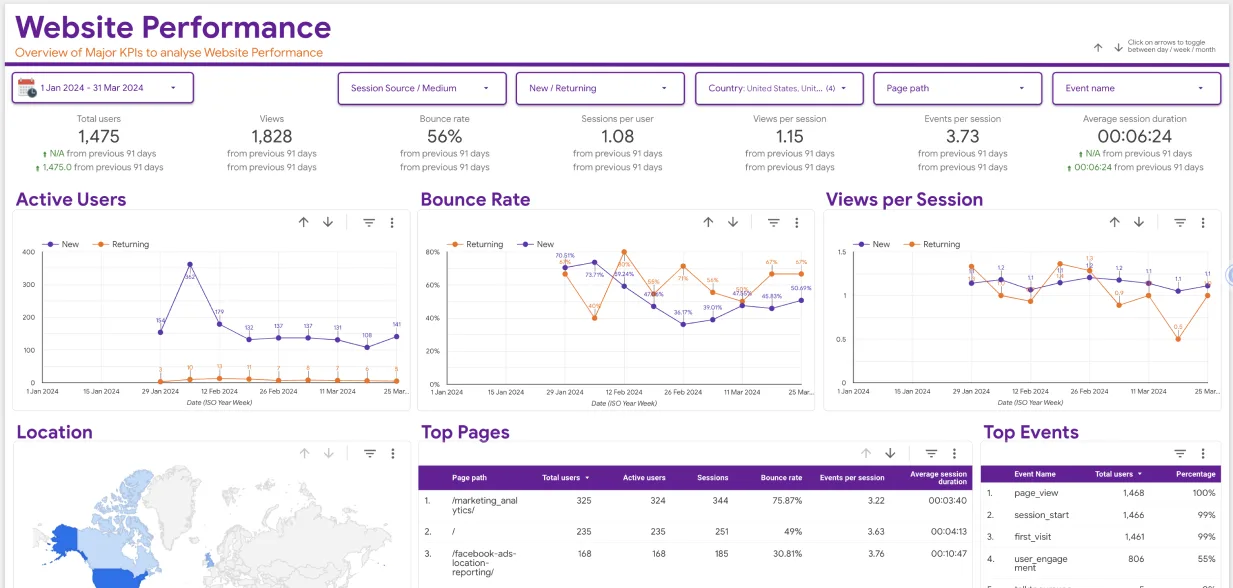The world of e-commerce is evolving at a breakneck speed, driven by the constant innovation of technology. Among the many tools that have emerged to shape this dynamic industry, data analytics is one of the most impactful. In 2024, data analytics is not just a tool for gathering numbers; it’s a comprehensive strategy to decode consumer behavior, optimize operations, and predict future trends. E-commerce businesses are now relying heavily on Data Analytics Consulting for E-commerce to stay ahead in a fiercely competitive marketplace.
In this blog, we’ll explore how data analytics transforms the e-commerce landscape and what specific changes we can expect in 2024.
1. The Growing Role of Data Analytics in E-commerce

Over the last decade, e-commerce has shifted from a simple online shopping platform to a data-driven industry. Every interaction, from a customer browsing a product to completing a purchase, leaves behind valuable data. This data is no longer just for inventory management or financial forecasting. It’s used for everything from hyper-personalizing customer experiences to predicting product demand.
In 2024, data analytics consulting for e-commerce is expected to be even more crucial as businesses struggle to make sense of massive datasets. Companies are realizing the power of advanced analytics to convert raw data into actionable insights that drive real-time decision-making.
For instance, online retailers can use predictive analytics to forecast buying trends based on historical data. This allows businesses to stock the right products, create targeted marketing campaigns, and ultimately increase customer satisfaction and revenue.
2. Personalization: Enhancing the Customer Experience
Customers today demand a more personalized shopping experience. They expect e-commerce platforms to know their preferences and provide recommendations tailored to their interests. In 2024, personalization will no longer be a “nice-to-have,” but a necessity, and this is where data analytics comes into play.
By analyzing user behavior—such as browsing history, past purchases, and even the time spent on specific product pages—businesses can create a hyper-personalized experience for each customer. Data Analytics Consulting for E-commerce helps businesses identify patterns in customer behavior, enabling them to offer tailored recommendations, targeted advertisements, and personalized discounts.
Amazon, a leader in the e-commerce industry, has been leveraging data analytics to provide personalized product recommendations for years. However, the level of sophistication expected in 2024 will be unmatched, with algorithms becoming more intuitive and understanding even nuanced customer preferences.
3. Optimizing Pricing Strategies
In a competitive e-commerce environment, pricing strategies can make or break a business. With so many variables—supply chain fluctuations, competitor pricing, customer demand, and seasonal trends—setting the right price can be complex. Data analytics offers the ability to implement dynamic pricing, allowing businesses to adjust prices in real-time based on market conditions.
In 2024, data analytics consulting for e-commerce will play a key role in helping businesses fine-tune their pricing models. Through advanced analytics, companies can monitor competitors’ pricing, evaluate demand elasticity, and predict consumer responses to price changes.
Price optimization algorithms can also provide insights into when to offer discounts and promotions, maximizing profitability while keeping customers engaged. This strategic pricing approach will set successful e-commerce brands apart from the competition.
4. Improving Inventory Management

Inventory management has always been a crucial aspect of e-commerce. Over or understocking can significantly impact profitability. Traditional inventory management systems often rely on historical sales data and basic forecasting methods, which are sometimes prone to error.
In 2024, businesses will rely more on real-time data analytics to make better inventory decisions. Data analytics consulting for e-commerce can help businesses leverage advanced tools to predict inventory needs based on demand forecasting models. These models consider factors such as sales trends, seasonal variations, and external factors like economic conditions.
With accurate inventory predictions, e-commerce companies can minimize waste, avoid stockouts, and reduce carrying costs. Additionally, real-time inventory analytics can help businesses optimize their supply chain, ensuring they are always stocked with the right products at the right time.
5. Predictive Analytics for Future Trends
One of the most exciting developments in the e-commerce industry is using predictive analytics to forecast future trends. Predictive analytics combines historical data with machine learning algorithms to predict what’s likely to happen next. Whether predicting the next big product or identifying upcoming customer demands, predictive analytics is a game-changer for e-commerce.
In 2024, data analytics consulting for e-commerce will be essential for businesses looking to stay ahead of the curve. Predictive analytics allows companies to:
- Identify emerging market trends
- Optimize product assortments
- Anticipate changes in customer behavior
- Predict shifts in competitor strategies
For example, businesses can analyze social media trends, customer reviews, and industry reports to predict what products will be in demand in the next quarter. This proactive approach can give e-commerce businesses a significant advantage, allowing them to capitalize on trends before they fully emerge.
6. Enhancing Marketing Campaigns
Marketing is the backbone of any e-commerce business. With an ever-growing number of channels and platforms to reach customers, making informed decisions about where to allocate marketing spend is critical. Data analytics plays a pivotal role in this process.
In 2024, data-driven marketing will reach new heights. E-commerce businesses will use advanced analytics to gain insights into customer demographics, buying behavior, and engagement across multiple touchpoints. Data analytics consulting for e-commerce will help brands fine-tune their marketing strategies by providing deep insights into which campaigns perform best and why.
For instance, businesses can analyze customer lifetime value (CLV) and acquisition costs to determine the most profitable marketing channels. Analytics can also help businesses create more effective email marketing campaigns by identifying customer segments more likely to engage and convert.
Furthermore, predictive analytics can identify which customers are at risk of churn, allowing businesses to implement retention strategies, such as personalized offers or loyalty programs, before losing valuable customers.
7. Fraud Detection and Security
As e-commerce grows, so does the risk of cyberattacks and fraud. Businesses need to stay vigilant about protecting customer data and ensuring secure transactions. Data analytics is becoming crucial for detecting fraudulent activity in real-time.
In 2024, data analytics consulting for e-commerce will play a vital role in strengthening security measures. Machine learning algorithms can be trained to identify unusual patterns in transaction data, such as multiple purchases from different locations within a short timeframe, which may indicate fraudulent activity.
Additionally, data analytics can help businesses comply with data privacy regulations by monitoring how customer information is used and ensuring that it is stored securely.
8. The Role of AI and Machine Learning in Data Analytics
Artificial intelligence (AI) and machine learning are the driving forces behind data analytics transformation in e-commerce. AI-powered analytics can process vast amounts of data in seconds, providing insights that would take humans days or weeks to uncover.
In 2024, data analytics consulting for e-commerce will increasingly rely on AI and machine learning to automate decision-making processes. From personalized product recommendations to demand forecasting and fraud detection, AI-driven analytics will enable businesses to operate more efficiently and effectively.
Conclusion
In 2024, the e-commerce industry will continue to evolve rapidly, and data analytics will be at the forefront of this transformation. By leveraging the power of data, e-commerce businesses can personalize the customer experience, optimize pricing and inventory, and predict future trends.
For businesses looking to stay competitive, investing in Data Analytics Consulting for E-commerce is not just a smart choice—it’s a necessity. With the right analytics tools and strategies, e-commerce brands can unlock new opportunities, improve operational efficiency, and provide a seamless customer experience that drives growth.
As the industry embraces data-driven decision-making, those who fail to adapt risk being left behind. Don’t wait—start leveraging data analytics today to transform your e-commerce business for the future. Want to find out more? Visit us at Eaglytics!






